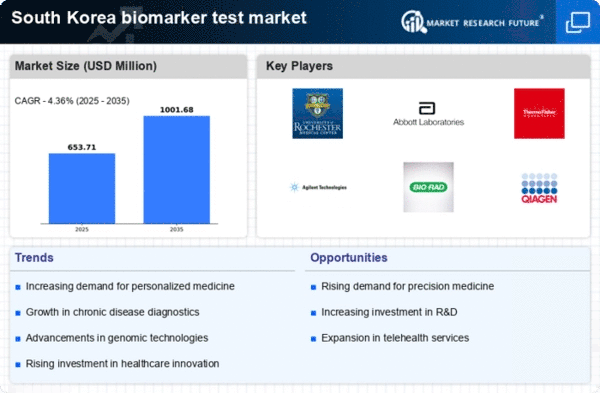Rising Prevalence of Chronic Diseases
The increasing incidence of chronic diseases in South Korea is a pivotal driver for the biomarker test market. Conditions such as cancer, diabetes, and cardiovascular diseases are becoming more prevalent, necessitating advanced diagnostic tools. According to recent health statistics, chronic diseases account for approximately 80% of healthcare expenditures in the country. This trend underscores the need for effective biomarker tests that can facilitate early detection and personalized treatment strategies. As healthcare providers seek to improve patient outcomes, the demand for biomarker tests is expected to rise significantly, potentially leading to a market growth rate of over 15% annually. The biomarker test market is thus positioned to play a crucial role in addressing these healthcare challenges.
Investment in Research and Development
Investment in research and development (R&D) within the healthcare sector is a significant driver for the biomarker test market. South Korea has been increasing its R&D spending, with the government allocating approximately 4.5% of its GDP to research initiatives. This focus on innovation fosters the development of novel biomarker tests that can enhance diagnostic accuracy and treatment efficacy. The biomarker test market benefits from collaborations between academic institutions and private companies, leading to breakthroughs in biomarker discovery and validation. As a result, the market is likely to see a surge in new product launches, further stimulating growth and expanding the range of available testing options.
Technological Integration in Healthcare
The integration of advanced technologies in healthcare is a crucial factor influencing the biomarker test market. Innovations such as artificial intelligence (AI) and machine learning are enhancing the capabilities of biomarker tests, allowing for more accurate and efficient analyses. In South Korea, the adoption of these technologies is accelerating, with healthcare facilities increasingly utilizing AI-driven platforms for data interpretation. This technological evolution is expected to improve the reliability of biomarker tests, thereby increasing their acceptance among healthcare professionals. The biomarker test market stands to benefit from this trend, as enhanced testing capabilities may lead to higher demand and improved patient outcomes.
Growing Demand for Preventive Healthcare
The shift towards preventive healthcare in South Korea is driving the biomarker test market. With an increasing awareness of health and wellness, individuals are seeking proactive measures to monitor their health status. Biomarker tests offer valuable insights into disease risk and progression, aligning with the preventive healthcare paradigm. The market is witnessing a rise in consumer interest, with surveys indicating that over 60% of South Koreans are willing to undergo regular biomarker testing. This trend is likely to encourage healthcare providers to integrate biomarker tests into routine check-ups, thereby expanding the market's reach and accessibility.
Aging Population and Increased Healthcare Spending
The aging population in South Korea is a significant driver for the biomarker test market. As the demographic shifts towards an older population, the demand for healthcare services, including diagnostic testing, is expected to rise. Older adults are more susceptible to various diseases, necessitating the use of biomarker tests for early detection and management. Furthermore, healthcare spending in South Korea is projected to increase, with estimates suggesting a growth rate of around 7% annually. This increase in expenditure is likely to facilitate greater access to biomarker tests, thereby propelling the market forward. The biomarker test market is thus well-positioned to capitalize on these demographic trends.
















